Live an Anishinaabe Life
And every footstep is a prayer
Boozhoo, indinawemaaganidog! Aaniin! That is to say hello, all of my relatives! Welcome to another edition of An Irritable Métis. I am grateful to have you here reading this newsletter. It has been an amazing experience watching this audience grow and I absolutely do not take it for granted. Related to that, I would like to mention THIS ESSAY I was asked to write for the Inbox Collective, which went live last week. They first interviewed me a couple years ago and I told them I had no plans for ever adding a paid option to my newsletter. Obviously that changed, and if not for all of you wonderful people there would have been no reason for them to ever follow up with me again. So, again – chi-miigwech for everything.
Since I am opening with announcements, let me remind you that there are a few days left on the silent auction to benefit the Freeflow Foundation. There are still plenty of great items being auctioned off so please check that out HERE. All the money raised will be used to provide scholarship opportunities for folks to experience a Freeflow Institute adventure and that is a great thing. Finally, if you want to help out but don’t need more stuff in your life, you may also choose to attend the “Voices of Freeflow” event. It is an online, virtual celebration featuring readings from three Freeflow scholars (i.e. writers who have participated in past adventures) and two Freeflow instructors, including the magnificent Heather Hansman and … me! The event is free but you may also donate and your generosity will be deeply appreciated. All the info is HERE. It would be awesome to have some Irritable Subscribers in attendance! It is this Thursday night, December 8th, at 6:30pm Mountain Time.
Finally, it is the season of gifts! You could give someone something like this one. Or this one. Or the following thing and the thing that follows that thing possibly for yourself….
A Spiritual Practice
On the morning of Thanksgiving I ventured out to Council Grove1 just after sunrise. It was a cold, beautiful, misty morning. On the road in, just before the parking area, one traverses a bridge that spans a slough. I looked to my left as I eased across and there, swimming along through an ice-free channel, surrounded by dead and frosted cattail remains, was a muskrat. As soon as I stopped to look closer he disappeared with a dive and a splash. I was pleased and fortunate to see him. I could have turned around then and been fulfilled.
I continued on though; parked my truck, slung my binoculars over my neck, and headed out afoot, eager to see what I could see. You might even say I was abrim with enthusiasm! A medium-sized flock of Canada geese honked by overhead – a sight I will always make time to stop and watch – and as I sauntered through the forest of mostly ponderosa pines and cottonwoods there were many northern flickers, chickadees, and magpies. This forest is a combination of snags and living trees and most tell a story of one kind or another, of encounters I’ve had near them, or times I stuck my nose in a barky crevice and took a deep whiff, or even when I felt watched and looked up to see an owl eyeballing me from above. It is a beautiful place to marvel over the seasonally changing light: how it marks the sky, how it slants through the trees, how it too tells uncountable stories.
Reaching the river, around and in its shallow course were mallards, a few killdeer, and two kingfishers. Everyone was so noisy! At the far southwest corner of the area where the slough loops around and washes into the river I saw another muskrat. Two in one day!
Farther along I followed a trail that drops right down next to the river – or this side channel of it, anyway, as the main river from where I was is on the far side of an island created by this meander that is essentially a kind of oxbow – and is inaccessible when the water is higher. I was standing and just looking about, enjoying the morning, glassing the treeline opposite, when a great blue heron rose up from below my field of vision about fifty yards away. He slowly beat his massive wings to gain a little altitude but he didn’t seem to be interested in leaving the area. He was probably just relocating for better hunting and was headed straight for me. Maybe thirty feet away he realized I was standing there and he banked away to the east and flapped away. Still, it was a lovely experience to see him so close, close enough to hear the beat of his wings and a surprised little croak as he angled away from me.
Interactions like this, which aren’t infrequent, are deeply meaningful to me. Without them, I don’t know what kind of person I would be.
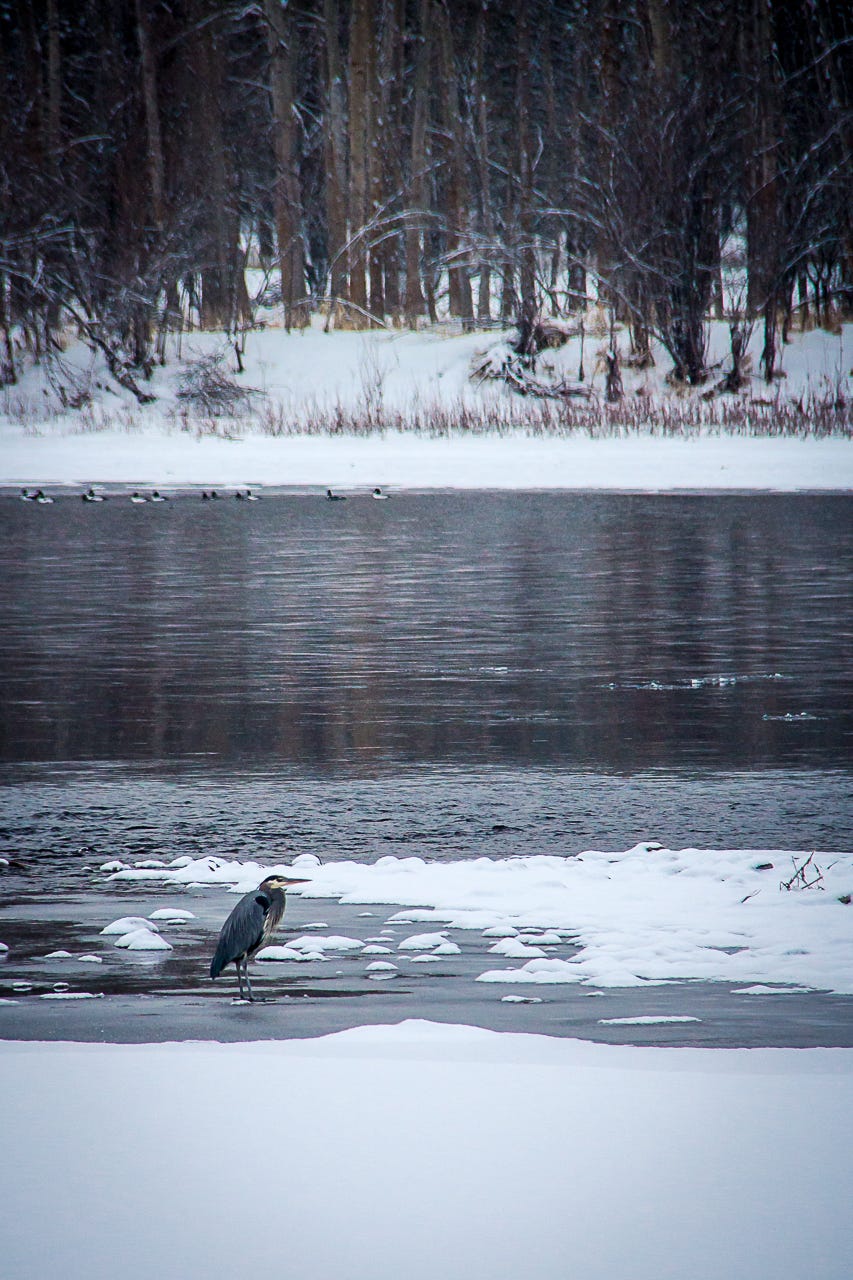
A couple newsletters ago I was promoting the online workshop I am leading in January for Poetry Forge called “Poetry as Spiritual Practice.” You may learn more about it HERE, and there are still a couple spots left if you hurry2. This will be the second time I’ve taken this workshop approach for Poetry Forge, and my third effort overall. It seems to be a workshop people enjoy. I know I do.
An irritable reader asked me recently via the comments what I mean by “poetry as spiritual practice.” Specifically he, Erik JM Schneider, asked this:
Have you written on poetry as a spiritual practice? I am terminally curious about perspectives elsewise than the EuroAmerican academic one, in which I am thoroughly drenched. But even within that tradition, once Plato wrote that he would ban poets from his Republic because we do not tell the truth, poetics itself has been in a position of resistance to pretty much everything else that grew up around it.
Which puts it close to spiritual practice, as I understand it anyway, as an escapee from Christian fundamentalism and into something like Zen and/or Insight Buddhist practice: in Zen especially, Buddhist practice looks to me like questioning everything one has ever been taught--especially when it looks and feels like someone else's projections of their own fears out into the world as it goes in spite of their (or my own) fever dreams.
That is the tiniest nutshell I could squeeze my own thoughts into. Would you care to say more about how you approach poetry as a spiritual practice: in general and/or in practical terms?
I must scratch my head a little bit when it comes to answering this question. Fortunately I don’t have a personal history with Christian fundamentalism beyond living in a country gurgling with it. I’ve read many Zen books, and many books with “Dharma” in the title, and I’ve read my share of Thomas Merton, but I wouldn’t pretend to know what any of it really means, and I think I like the idea of a Thomas Merton and his handful of carefully curated quotes than I do the actual dude. Some of the ideas work for me but many don’t. When it comes to my ideas of what a spiritual practice encompasses then, it is far simpler and way less dogmatic than any of these disciplines, while equally rich and all-encompassing and mind blowing. It is deeply personal and is therefore different for every person. The goal is for the discussions that happen during our time together in these workshops to honor all of that and find the commonalities instead of the differences. And hopefully share and write some lovely poems.
When it comes to the concept for the workshop, it is far from an original idea on my part. I was exposed to it as a workshop opportunity by two books: a collection of poems called The Poetry of Impermanence, Mindfulness, and Joy, edited by John Brehm, and The Dharma of Poetry, also by John Brehm. For the workshops I do, I recommend them as something like textbooks for the class because what they address is the basis that we start from. But they are just a starting place, and if the discussions go somewhere else, we go somewhere else. You don’t have to have ever so much as considered buying either one to participate. I’ve simply learned some people prefer something of a shopping list for these things, so I provide a small one.
If there is a key element to what this workshop is about, what pretty much any workshop I lead is about, it is this: paying attention. That to me is what a spiritual practice is also, paying attention. To the world and all the relatives we share it with; to ourselves, and to how we fit with everything else. Paying attention, finding empathy … just a couple simple, unbelievably difficult little ideas to focus on that, if you pull them off, can have a profound influence on your life.
"The land is the real teacher. All we need as students is mindfulness. Paying attention is a form of reciprocity with the living world, receiving the gifts with open eyes and open heart."
— Robin Wall Kimmerer
I read a quote somewhere from the late Eddie Benton-Banai. He talked about living an Anishinaabe life, and that when one does so, every footstep becomes a prayer. If there is a spiritual practice I am actively pursuing these days, it is this. Which sounds more dedicated than it really is because I don’t know anyone in my day-to-day life who shares this pursuit, at least in name. It lives largely in my head, I think, and there are probably stern people who would get mad at me for daring to call it what I do. But since I am Anishinaabe, it’s not like I’m appropriating anything. It’s not like I am sharing forbidden wisdom here either because I don’t carry any. I’m just an overly irritable fuck-up. So what.
So how then does one (allegedly) follow a spiritual path without access to mentors, to elders, to fellow seekers on a similar path? I don’t have the answer to that but I can tell you how I’ve chosen to do so: by returning to the source. The world. The land. Nature. Whatever you want to call it. That wild and unpredictable world that exists outside of these miserable, glowing screens. The same voices that spoke to my ancestors across millennia are still out there, whispering, waiting for us to start listening again. I am trying to. That is what I mean by paying attention.
Along the way I feel Migizi, the Eagle, has talked to me. I feel Bizhiki, the Buffalo, has talked to me. One represents Love, the other Respect. They are constantly talking to me. There are five more teachings, five more powerful relatives, I hope will talk to me too. So I keep listening. I listen every day, even if some days I’m better at it than others.
I take this perspective into the classroom with the kids I teach. I urge them to pay attention. I tell them about living an Anishinaabe life, and I tell them that poetry too is life, that it isn’t just words on a page. Anything can be a poem. The wind rippling the surface of the water at Ninepipes, breaking up the reflection of the Mission Mountains, is a poem. The swish of a basketball getting “nothing but net” is a poem. That first hot, crispy bite of a chicken nugget is a poem. I ground them in the experiences they know and they get it and expand.
If you pay attention, you are living a life of poetry, I tell them. Then every footstep becomes a poem.
Everything is connected.
The Sighting
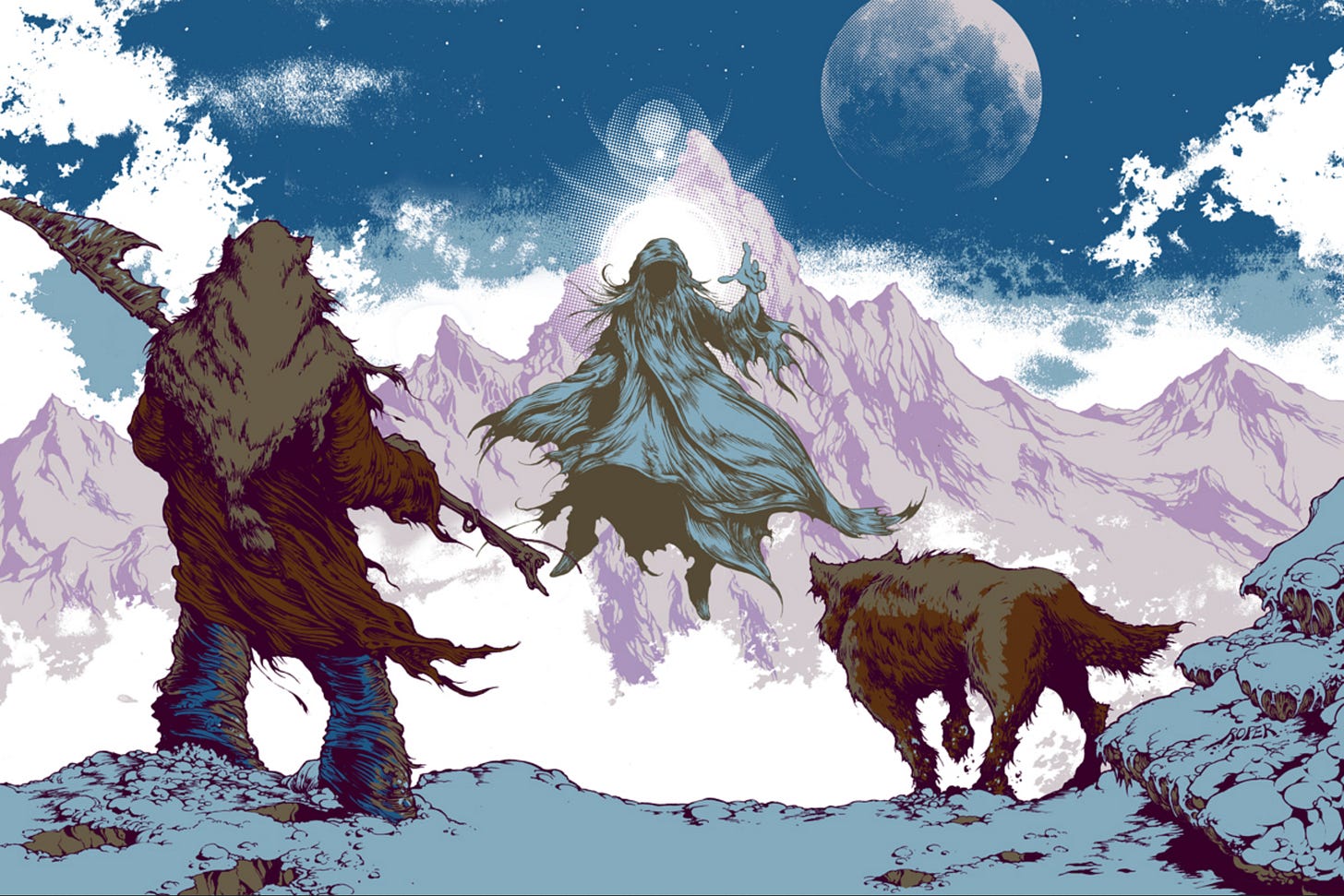
I have a big, 24 x 36 signed and numbered version of this print hanging on my wall. It’s maybe seven feet from me right now, somewhat hidden in shadow. I came to know the artist, Arik Roper, through his work with stoner metal bands like Sleep and High on Fire3. When I wrote and photographed my first cover feature for the late, great Missoula Independent, I used the payment to buy the print and get it framed because I love it. I have a quote from somewhere of Roper explaining the piece. He says:
“The Sighting illustrates a metaphor of gaining insight and perspective from a new position. The Ice Age-era hunter and his Wolf companion represent the Mind in its unadvanced stages, wandering and laboriously ascending the mountain in search of nourishment. The floating Apparition represents the Revelation flash of the advanced Mind, gained from the new point of view and progress on the mountain. The encounter initially appears as a meeting of two separate entities but is ultimately a meeting with the self.”
That’s interesting, I suppose, if more complex than what I get out of it. I’m not a very heavy thinker. So the contrast in perspective sums up the difference between one approach to Spirit, and then mine. To me the image is just a person and their canine companion, out in the wild mountains, having each other’s backs, coming face to face with Spirit, and it’s cool. I kinda want to be that dude, you know? I bet he doesn’t worry if the W-9 he sends everyone is dated three years ago, or wastes precious sleep time wondering if the (also alleged) pizza burger from Wendy’s is any good. Is that so different from Roper’s take? I don’t think so. It’s just a little simpler. And, if I may say so, cooler.
Spirituality should be cool. Shouldn’t it?
Miigwech for reading. I hope there was something interesting here for you. I closed with the bit about the Roper print because just today the following piece that I forgot I ordered who-knows-when – also a Roper print – arrived. I really like it. Sometimes I I get so tired of getting worked up over land acknowledgements, over understanding landback and thinking the people explaining it really need to get on the same page, over colonialism, over all of it, and I just want to view things through the lens of the nerdy high schooler I used to be. Maybe I just want to imagine myself as something like this guy again:
But probably not.
Speaking of which, my next paid subscriber only post is going to be a photo essay from this place. Not to be missed!
As in less than five, and those are the virtual equivalent of “standing room only” seats, so don’t wait any longer!
My band opened for High on Fire years ago. My friend Jimmy, who plays guitar, still crows with pride over how Matt Pike, singer/guitar player for HoF, one of the loudest bands on the planet, while hanging out after the show said to him, “Man, when you guys started playing I was like, ‘These guys are fucking loud!’”

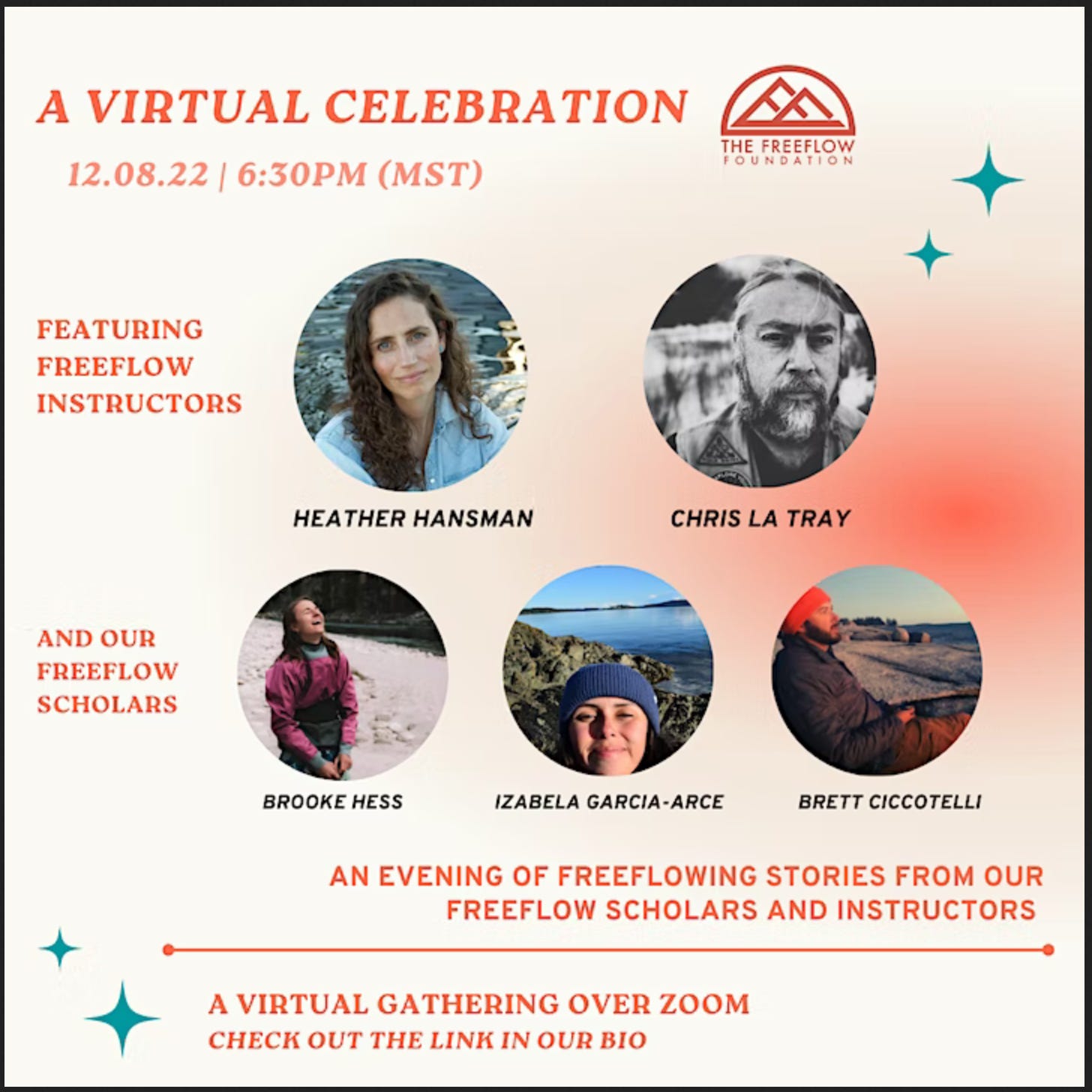
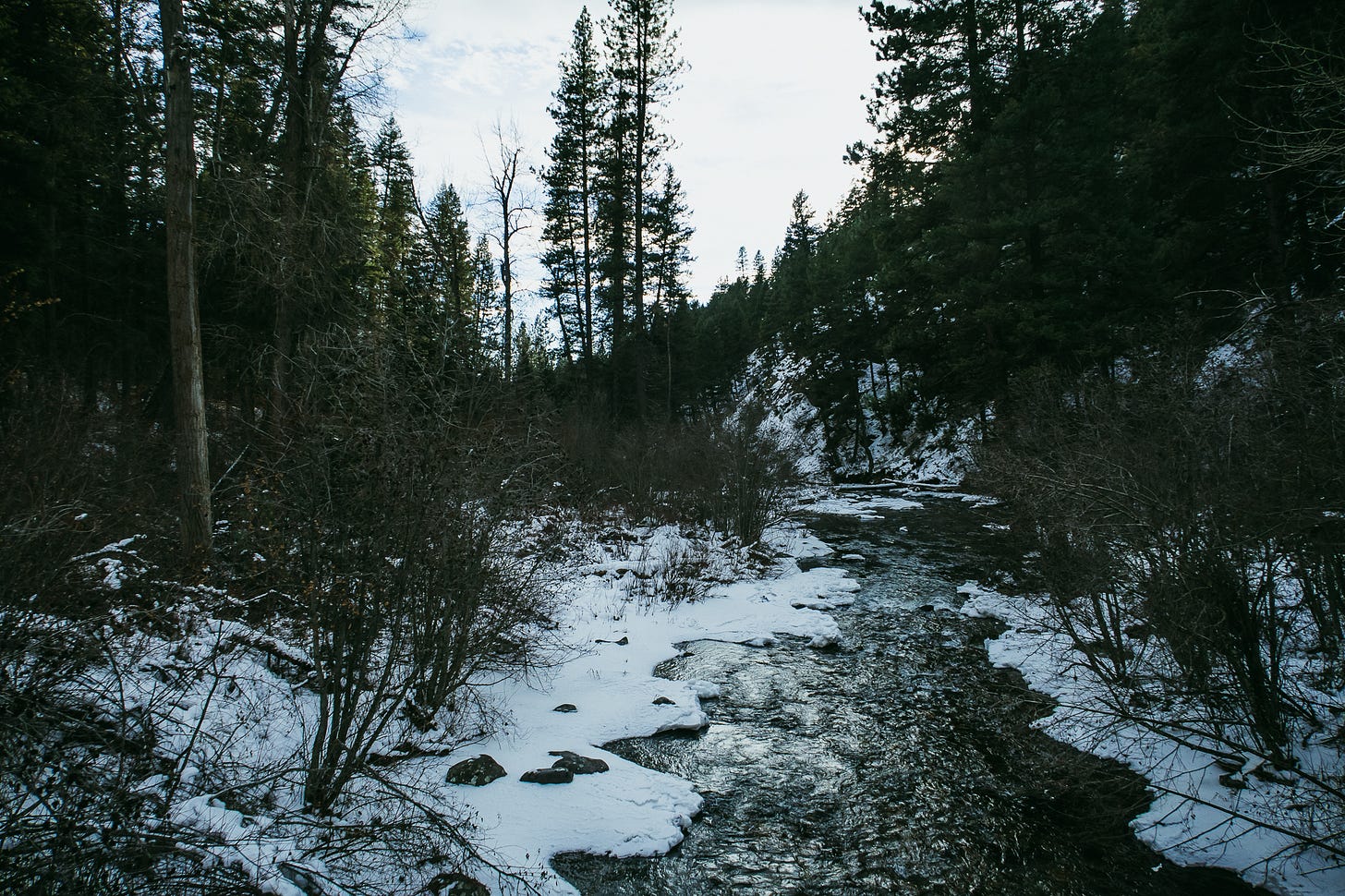
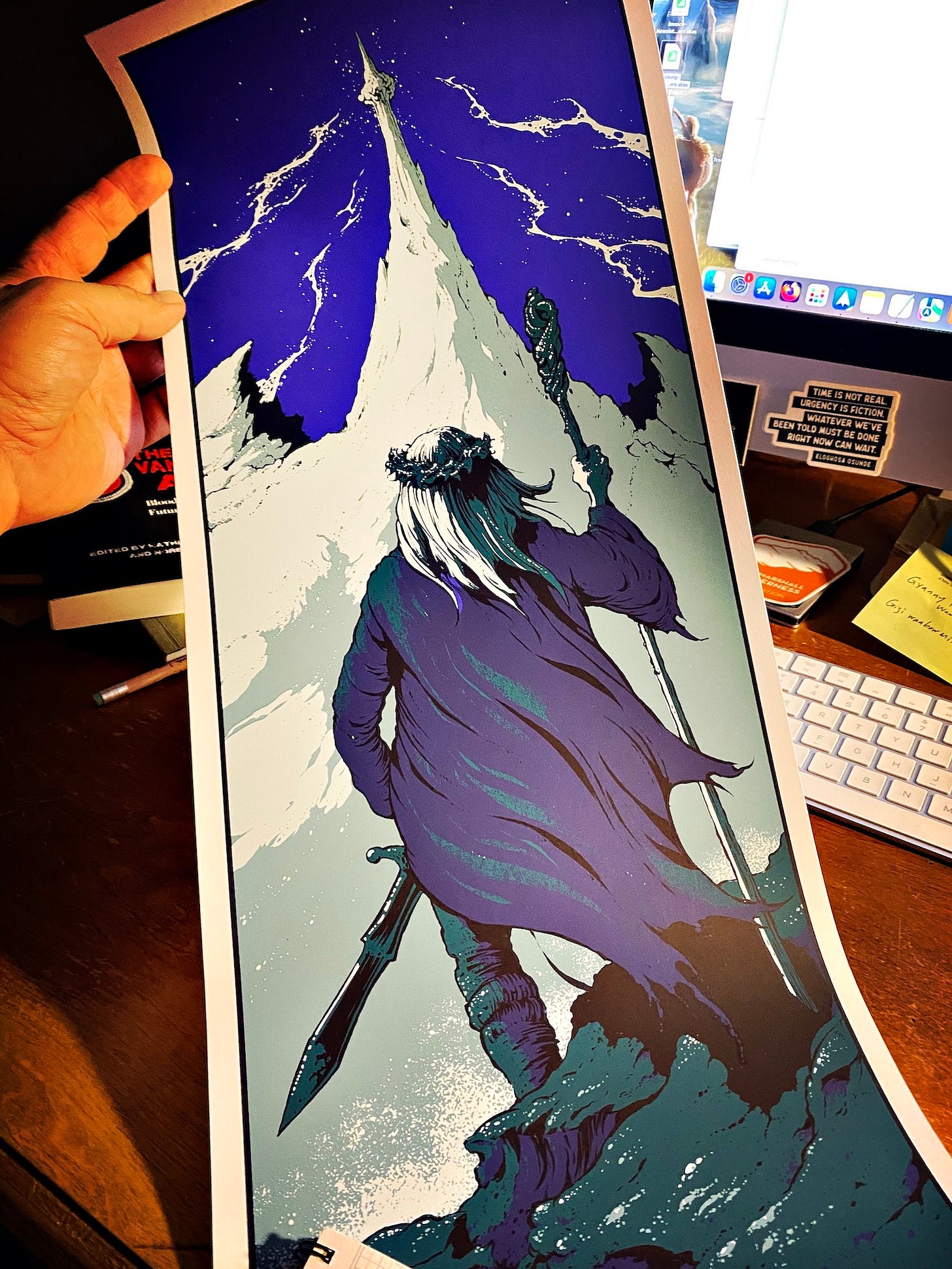
I think you do yourself a disservice by saying you're not a deep thinker Chris. And I bet lots of my peeps here would agree!
I love this paragraph with my whole being: "by returning to the source. The world. The land. Nature. Whatever you want to call it. That wild and unpredictable world that exists outside of these miserable, glowing screens. The same voices that spoke to my ancestors across millennia are still out there, whispering, waiting for us to start listening again. I am trying to. That is what I mean by paying attention." Me too.